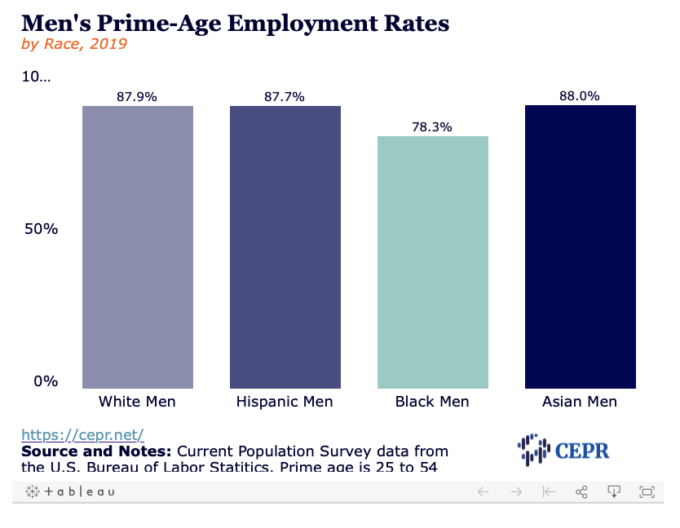The best the current American labor market can provide is a huge gap in employment for Black men. The lowest Black unemployment rate on record was in 2019. That was also the year that Black men had the highest unemployment rate of the major race-gender groups. This is not unusual. Black men have had the highest annual unemployment rate consistently for the last 20 years. In 2019, Black men’s historically “low” annual unemployment rate was a rate that white men typically experience in the wake of an economic recession. As bad as this may seem for Black men, the unemployment rate does not fully capture the problem of joblessness facing Black men.
Not all of the jobless are officially classified as unemployed by the Bureau of Labor Statistics. A better way to see Black men’s heightened challenge with joblessness is to examine the share of the male population that is working or not working by race. This way, men who are officially unemployed, as well as those who are not working but are not technically counted as unemployed, can be both counted as jobless. It is also best to look at the prime-age or 25-to-54-year-old population because this age group is most likely to be working. Even for the prime-age population, however, some men cannot work because of disabilities or because they are caring for family members or because they are in school full-time. Even among prime-age men, less than 100 percent of them are working.

Looking at the annual average employment rate in 2019, nearly 90 percent of prime-age white, Hispanic, and Asian American men were working. However, for Black men, only about 80 percent of them were working. Black men lagged by nearly a whopping 10 percentage points. To put this another way, Black men needed almost an additional 800,000 jobs to have the same employment rate as other men. And, we should remember, by the unemployment rate, this was the best labor market for Black men on record.
Clearly, this “best” is not good enough. If prime-age Black men had the same employment rate as other men, Black families and communities would gain an additional $30 billion each year in income. We won’t be able to fully address Black poverty and the problems stemming from Black poverty while so many Black men have zero income.
While there are multiple factors driving the high rate of joblessness for Black men, we must not ignore the role of overt and covert racial discrimination. More than a decade ago, the sociologist Devah Pager and others convincingly showed that Black men with the same qualifications as white men were much less likely to be hired by employers. Pager found that a Black man without a criminal record had the same chance with employers as a white man with a criminal record. A 2017 review of 25 years of field studies of discrimination found no decline in anti-Black discrimination in the labor market.
Another challenge Black men face is, as the adage states, “it is not what you know, but who you know.” The sociologist Deirdre A. Royster and others have shown that Black men are also disadvantaged because they are less likely to know the right people to help them find jobs. Royster followed Black and white young men with the same educational backgrounds and skills from the same high school. The white young men were connected to older white men who had blue-collar jobs and could help them find those jobs. Because Black men were historically excluded from those blue-collar jobs, the young Black men had no similar connections and thus were not able to obtain those jobs either. Today, no one needed to explicitly deny young Black men entry into those blue-collar jobs; Black young men didn’t even know of their existence to apply for them. White social networks help white people find work while excluding Black people.
To address these forms of racial discrimination in the labor market, we need a stronger commitment to anti-discrimination laws to address the more overt forms of discrimination and a stronger commitment to affirmative action to counteract the covert anti-Black biases in the labor market. We will also need targeted job creation policies to address the lack of jobs in economically depressed Black communities like Detroit. (Majority Black Detroit had a 9 percent unemployment rate in 2019. In majority white Ann Arbor, it was 2.3 percent.) While these policies will help address the challenges Black men face in finding work, they will also help Black women (who also suffer from very high unemployment) and other people of color. Ultimately, they will make America a stronger and more economically productive country for all.